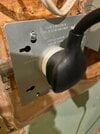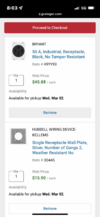CosmosMpower
Member
I had an electrician install my 14-50. He used a Bryant 14-50 with 6AWG copper on a short 2-3 foot run just below my panel with a 50 amp breaker.
I’ve been using a gen 2 mobile charger at 32 amps and 240ish volts for a few days no issues.
I bought a used gen 1 mobile charger mostly as a backup but Can I safely use it with Teslas gen 1 14-50 adaptor at 40 amps instead of 32 amps without any issue? I figure 40 amps out of 50 amp breaker is 80% capacity and 6awg should be plenty to support 40 amps right?
I’ve been using a gen 2 mobile charger at 32 amps and 240ish volts for a few days no issues.
I bought a used gen 1 mobile charger mostly as a backup but Can I safely use it with Teslas gen 1 14-50 adaptor at 40 amps instead of 32 amps without any issue? I figure 40 amps out of 50 amp breaker is 80% capacity and 6awg should be plenty to support 40 amps right?





